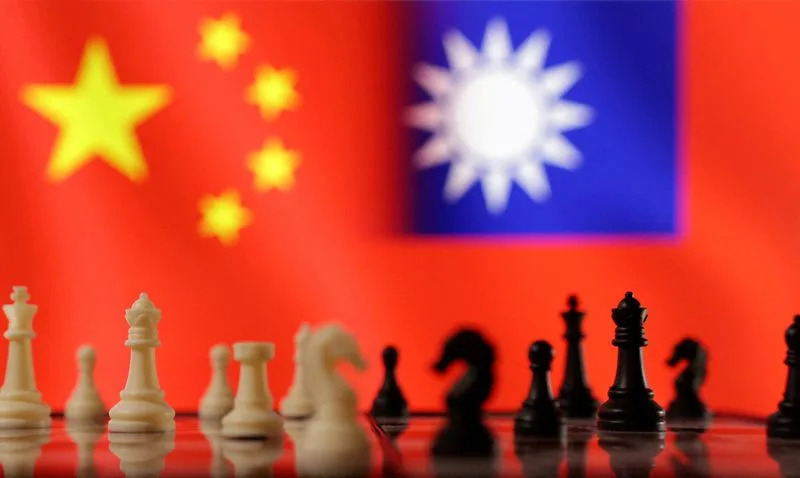China's national security apparatus vowed on Friday to fight back against a narrative war over its economic condition, elevating the issue about how to describe the status quo and outlook of the Chinese economy to the level of economic security.
The statement from the Ministry of State Security came three days after the tone-setting central economic work conference, during which President Xi Jinping pledged to maintain economic stability, guide public opinion and play up China's "bright prospects" in 2024.
The economic domain has become a "battlefield" of superpower rivalry, and dealing with various cliches denigrating China's economy has become an external challenge, the ministry said on its WeChat account.
"Talk concerning China's decline is in essence an intention to create a 'narrative trap' or a 'cognitive distortion'," it said.
"It aims to doubt or deny China's socialist system and attempts to strategically contain China's development.
"There are some people with ulterior motives. They are fabricating a China threat again ... with the intention to disrupt market expectations and economic growth momentum."
In the statement that followed the two-day central economic work conference, which concluded on Tuesday, Beijing's top leadership claimed China had "withstood the external pressure and overcome domestic difficulties" this year, with the world's second-largest economy set to hit its 2023 growth target of "around 5 per cent".
It also placed a focus on economic construction and listed development as China's "biggest political priority".
The growth rate would be higher than most developed nations, including the United States and European countries.
But analysts point to the crisis involving Evergrande, Country Garden and other property developers, the debt mountain facing local government financing vehicles, high youth unemployment, a demographic crisis and faltering investor confidence, as potential problems for future growth.
"The national security ministry must echo the top leadership's mandate and we know the backdrop of intensifying rivalry with America," said a Shanghai-based scholar, who asked not to be identified due to the sensitivity of the issue.
"We still wonder if normal discussions about the problems of the economy will inadvertently cross the vague red line, now that Beijing clearly wants us to focus on the bright prospects."
It is not the first time that the state security ministry has touched economic topics, having warned about the security of strategic minerals overseas at the end of November.
Earlier this month, it also defended Beijing's high-profile investigation into foreign firms on national security grounds.
The moves against the likes of Capvision, Bain & Company and Mintz Group were seen to contrast with widespread efforts by Beijing to lure both foreign and private investors with a promise of equal treatment and wider market access.
On Friday, the Beijing-based semi-official China Chamber of International Commerce set up a work committee to help solve complaints and problems raised by foreign-funded firms.
US approves $300 million support for Taiwan's tactical information systems
The U.S. State Department has approved a $300 million sale of equipment to help maintain Taiwan's tactical information systems, the Pentagon said on Friday, the latest U.S. assistance for the island's defenses.
The United States is bound by law to provide Chinese-claimed Taiwan with the means to defend itself and arms sales are a frequent source of tension between Washington and Beijing.
The Pentagon's Defense Security Cooperation Agency said the sale was for follow-on life cycle support to maintain Taiwan's Command, Control, Communications, and Computers, or C4, capabilities.
The support would improve Taiwan's capability to "meet current and future threats by enhancing operational readiness" and maintain existing C4 capabilities that provide secure flow of tactical information, it added.
Taiwan's defense ministry said the sale will help maintain the effectiveness of its joint combat command and control systems so it can improve battlefield awareness.
"The Chinese communists frequent military operations around Taiwan presents a serious threat to us," the ministry said, adding it expected the sale to "take effect" in one month and expressed its thanks to the United States for the sale. The U.S. Congress will be notified and the sale is likely to go ahead.
Democratically governed Taiwan has complained of repeated Chinese military activity near the island over the past four years, as Beijing seeks to asserts its sovereignty claims.
Taiwan's defense ministry said on Saturday morning that in the previous 24 hour period it had detected nine Chinese military aircraft crossing the sensitive median line of the Taiwan Strait.
That line used to serve as an unofficial barrier between the two, but China's air force now regularly sends its aircraft across it, though they have not flown into Taiwan's territorial air space.
Taiwan, whose government says only the island's people can decide their future, holds presidential and parliamentary elections on Jan. 13 which will shape the island's future relations with China.
China pressures Taiwan with trade accusations and warplanes a month before election.
China on Friday pressured Taiwan with a trade barrier probe and warplanes in the Taiwan Strait a month before the island holds key elections, as Taipei called on Beijing to stop its "political operations".
The Jan. 13 presidential and parliamentary elections are taking place as China, which views the island as its own territory, has sought to force Taiwan to accept Chinese sovereignty claims.
Taiwan's government and the ruling Democratic Progressive Party (DPP) have repeatedly said China is trying to interfere in the vote, whether by military means or co-opting Taiwanese politicians, to ensure an outcome favourable to Beijing.
China's Commerce Ministry said it had determined Taiwan had put up trade barriers in contravention of both World Trade Organization (WTO) rules and a trade deal signed in 2010 with Taiwan. These barriers have had a "negative impact" on Chinese companies, it added.
The ministry stopped short of announcing any countermeasures. It was also unclear whether the investigation is over.
China's Taiwan Affairs Office, in a separate statement, said evidence from the probe is clear and that its conclusions objective and fair.
"We support the relevant authorities to study and take corresponding measures in accordance with regulations based on the final findings of the investigation on trade barriers to Taiwan," it said.
Separately, Taiwan's defence ministry said on Friday morning it had detected 10 Chinese military aircraft operating around the island, including J-16 fighters and H-6 bombers, carrying out "joint combat readiness patrols" with Chinese warships, part of what Taiwan calls routine harassment.
China in October said it was extending its trade barrier investigation to Jan. 12, the eve of Taiwan's elections. Taiwan denounced that at the time as election interference.
Taiwan's Office of Trade Negotiations, responding to the Chinese announcement of the investigation's conclusions, called them one sided, inconsistent with the facts and in violation of WTO mechanisms and norms.
"We will never accept it and call on China to stop their political operations immediately," it said in a statement.
Both are WTO members and can resolve issues there, it added.
"If China is sincere, our attitude is that we can talk at any time," said the office's spokesperson, James Hsiao.
Taiwan's Economy Ministry pointed to Chinese barriers to Taiwanese exports like banning "without warning many times" various aquatic and food products.
The government is working with Taiwanese companies to mitigate the "policy risks" associated with China, including diversifying exports markets, the ministry added.
The DPP's Lai Ching-te is the frontrunner to be Taiwan's next president, according to polls. China detests him believing him to be a separatist and has rebuffed repeated offers of talks.
China's Taiwan Affairs Office on Wednesday said Taiwan's elections were "purely an internal Chinese matter" and that the DPP was trying to call any kind of interactions between the two sides of the strait election interference.
Taiwan's government rejects China's sovereignty claims, saying only the island's people can decide their future.



